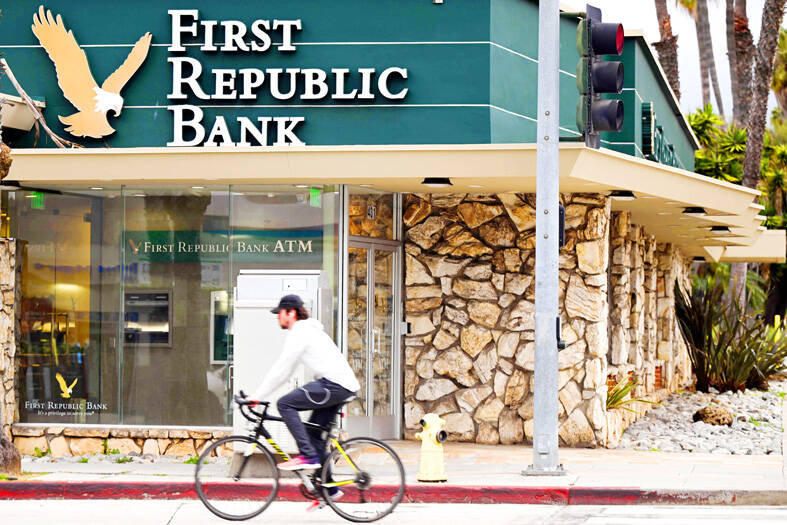US authorities are considering expanding an emergency lending facility for banks in ways that would give First Republic Bank more time to shore up its balance sheet, people with knowledge of the situation said.
Officials have yet to decide on what support they could provide First Republic, if any, and an expansion of the US Federal Reserve’s offering is one of several options being weighed at this early stage.
Regulators continue to grapple with two other failed lenders — Silicon Valley Bank and Signature Bank — that require more immediate attention.

Photo: AFP
Even short of that step, watchdogs see First Republic as stable enough to operate without any immediate intervention as the company and its advisers try to work out a deal to shore up its balance sheet, the people said, asking not to be named discussing confidential talks.
First Republic’s stock has plunged more than 90 percent this month amid concerns that the San Francisco-based lender could fall victim to the same forces that recently caused a trio of US banks to collapse.
However, while those banks toppled when rapid customer withdrawals forced them to lock in losses on depreciated assets, First Republic has remained open and independent.
US officials have been keeping close tabs on the firm’s health and progress — aiming to stay vigilant in case the situation unexpectedly changes.
Behind the scenes, they have concluded the bank’s deposits are stabilizing and that it is not susceptible to the kind of sudden, severe run that prompted regulators to seize Silicon Valley Bank within just a few days, the people said.
Though First Republic has structural problems with its balance sheet, it has cash to meet client needs while it explores solutions, the people said.
That includes US$30 billion deposited by the nation’s largest banks this month.
A potential adjustment to the Fed’s emergency lending program announced on March 13 is among options authorities have weighed in recent days, people with knowledge of the deliberations said.
Any expansion of the Fed’s liquidity offerings would apply to all eligible users, in keeping with banking law that says remedies must be broadly based, rather than aimed at helping a particular bank.
However, the change could be made in a way to ensure that First Republic benefits, the people said.
The banking crunch was exacerbated by troubles at Credit Suisse Group AG, leading the Swiss government to broker a deal for its takeover by longtime rival UBS Group AG.
Markets were gripped by fresh volatility on Friday with the focus on Deutsche Bank AG, which saw its shares slump the most in three years.
US Senator Elizabeth Warren has called for regulators to raise the guarantees on accounts above the current US$250,000 threshold.
However, US Secretary of the Treasury Janet Yellen has said regulators are not looking to provide “blanket” deposit insurance without working with lawmakers.

To many, Tatu City on the outskirts of Nairobi looks like a success. The first city entirely built by a private company to be operational in east Africa, with about 25,000 people living and working there, it accounts for about two-thirds of all foreign investment in Kenya. Its low-tax status has attracted more than 100 businesses including Heineken, coffee brand Dormans, and the biggest call-center and cold-chain transport firms in the region. However, to some local politicians, Tatu City has looked more like a target for extortion. A parade of governors have demanded land worth millions of dollars in exchange

Hong Kong authorities ramped up sales of the local dollar as the greenback’s slide threatened the foreign-exchange peg. The Hong Kong Monetary Authority (HKMA) sold a record HK$60.5 billion (US$7.8 billion) of the city’s currency, according to an alert sent on its Bloomberg page yesterday in Asia, after it tested the upper end of its trading band. That added to the HK$56.1 billion of sales versus the greenback since Friday. The rapid intervention signals efforts from the city’s authorities to limit the local currency’s moves within its HK$7.75 to HK$7.85 per US dollar trading band. Heavy sales of the local dollar by

Taiwan Semiconductor Manufacturing Co’s (TSMC, 台積電) revenue jumped 48 percent last month, underscoring how electronics firms scrambled to acquire essential components before global tariffs took effect. The main chipmaker for Apple Inc and Nvidia Corp reported monthly sales of NT$349.6 billion (US$11.6 billion). That compares with the average analysts’ estimate for a 38 percent rise in second-quarter revenue. US President Donald Trump’s trade war is prompting economists to retool GDP forecasts worldwide, casting doubt over the outlook for everything from iPhone demand to computing and datacenter construction. However, TSMC — a barometer for global tech spending given its central role in the

An Indonesian animated movie is smashing regional box office records and could be set for wider success as it prepares to open beyond the Southeast Asian archipelago’s silver screens. Jumbo — a film based on the adventures of main character, Don, a large orphaned Indonesian boy facing bullying at school — last month became the highest-grossing Southeast Asian animated film, raking in more than US$8 million. Released at the end of March to coincide with the Eid holidays after the Islamic fasting month of Ramadan, the movie has hit 8 million ticket sales, the third-highest in Indonesian cinema history, Film